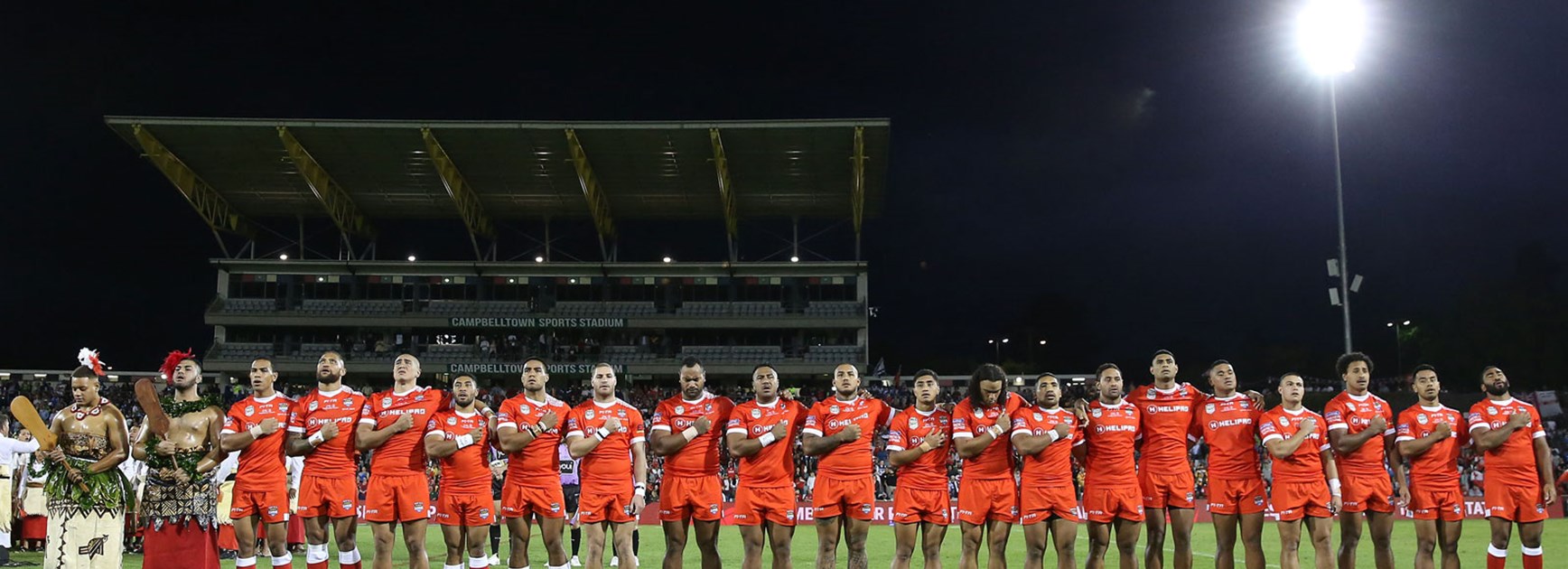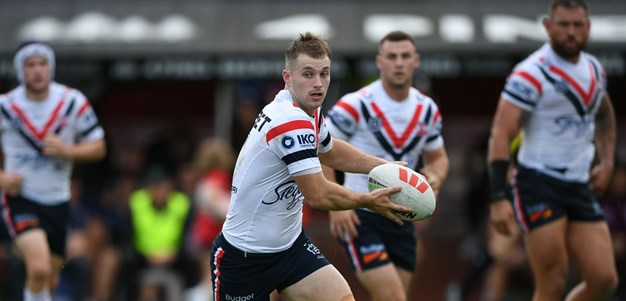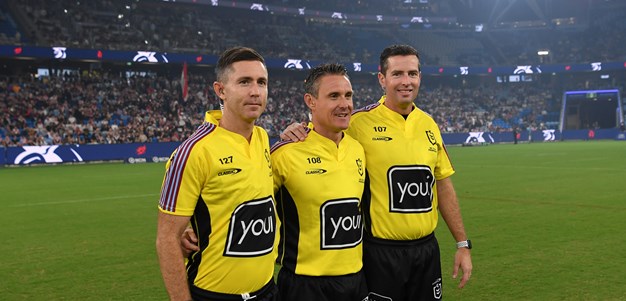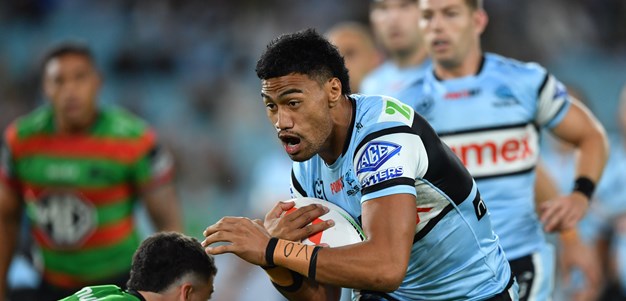
The defections of NRL stars Jason Taumalolo and Andrew Fifita to Tonga from New Zealand and Australia respectively have added plenty of hype to the Rugby League World Cup starting this month, but they also have raised questions about international eligibility.
With players now able to switch between a national team in the top tier (Australia, New Zealand and England) and a nation in the second tier, we could be headed for arguably the most even World Cup in history.
Has the freedom allowing players to switch national allegiances gone too far – or not far enough? We sat around the virtual roundtable to chat about the dilemmas facing the international game.
Dom (Dominic Brock, Production Editor): The big talking point about the World Cup so far is the decision by Jason Taumalolo and Andrew Fifita to switch their allegiance to Tonga. Where do you stand on the international eligibility rules that allowed that to happen? Good, bad, or somewhere in between?
Tony (Tony Webeck, Chief Queensland Correspondent): It's great that it has been allowed to happen, the crucial part in all of this is what we do next.
Gabz (Martin Gabor, National Correspondent): I'm all for it, although I don't necessarily agree with how it all went down (probably a debate for another day).
CK (Chris Kennedy, National Correspondent): Absolutely outstanding that players are no longer penalised for playing for an emerging rugby league nation. The lateness of a couple of the decisions has been criticised but broadly speaking I think it's a wonderful development for the sport globally.
Alicia (Alicia Newton, National Correspondent): Yeah I think the timing of what has happened with Taumalolo and Fifita isn't ideal, but their decision to play for Tonga is great for the game. What I would like to see in World Cup years is eligibility confirmed at the start of the season, to avoid the uproar late.
Dom: I guess the benefit of the current system on that front is that guys who miss selection for the tier 1 nations (eg. Tedesco for Australia) can play for smaller nations (eg. Italy).
Alicia: I meant that say if you pick a priority nation and one or two "back-up" countries in say January, you should lock in your allegiance by a certain date later in the year, not two days before announcement or after the squad is named. I'm obviously all for a Tedesco playing for Italy, we should have as many stars as possible in the tournament.
Dom: Oh, sure.
Tony: I feel like the only reason players choose one nation over another in the modern game is the disparity in financial inducements. We have to get to a point as a game where the heart rules the wallet in where players pledge their allegiances. It's the only way to make Test football and the World Cup relevant on a truly global scale.
CK: Is there any way to standardise payments for Test appearances and tournament appearances (minus, I guess, performance incentives) so that players are less out of pocket for choosing Tier 2 nations? Something for the RLIF to look at? Bearing in mind governing bodies in, say, Fiji and Cook Islands won't be able to compete with what Australia and NZ can offer financially.
Dom: Yeah, would that take some pretty significant changes in terms of where the money comes from? Or, basically generosity on the part of the bigger countries to spread the wealth among the smaller ones?
Gabz: We all want the best players to feature in the World Cup. It's great that Tedesco can run out for Italy, Jarryd Hayne can play for Fiji and Manu Vatuvei can represent Tonga. Maybe the clubs can offer cash incentives in their contracts; play Test footy (doesn't matter where) and you get a bonus. That could make the world game great again and keep players who are financially motivated happy.
Tony: I find it incredible that players competing for different countries in the same tournament receive such vastly differing levels of payment. I think we need to rein in what the top nations get and spread it more evenly to the others if we are ever going to get to a point of hosting a truly competitive World Cup. Kangaroos and Kiwis players have enough of an advantage without being paid 10 times more than what their opponents are receiving.
Gabz: To that point, Tony, how would you see that working? Is that an issue for the RLIF to consider or should the NRL, NZRL etc work on evening the playing field?
Alicia: Absolutely, if it was a level playing field financially I think there would be more big surprises with players opting for a minnow country. If you took money out of it and asked a player who they would like to play for, it would be interesting to hear the responses.
Tony: I think the RLIF absolutely has to standardise payments for all Test playing nations. If that means Kangaroo and Kiwi players receive less than they currently do so that money can be distributed or put back into grassroots programs then so be it. We need Test football to get away from being about financial rewards otherwise we'll stay mired in the same cycle we're currently in.
Dom: An international salary cap?
Gabz: Don't mind it. Marquee allowances to ensure fringe Australian and Kiwi players are equally paid should they play for a tier-two nation?
Tony: It might sound like the ravings of a simpleton but I think we have to find a way so that if you play an official Test for any nation you receive the same payment, whatever that might be. It's somewhat easier for Jason Taumalolo to walk away from $50k than other players not on such lucrative club contracts but we're effectively undermining the development of so-called tier two nations because the financial disparity – especially factoring in State of Origin – is so stark.
Dom: On the plus side, the current system is already achieving a lot of what we're talking about. Gabz you mentioned Tedesco playing for Italy, Hayne playing for Fiji, Vatuvei for Tonga – that's happening already without the financial incentives. And then there's Taumalolo and Fifita giving up big pay packets to represent Tonga, showing it's not all about financial rewards in some cases at least (when cash isn't such an issue, admittedly).
CK: Tony I agree in principle, the question is where does the money come from... if you make it an amount the tiny countries can afford then that amount would also be pretty inconsequential when you're asking a Cam Smith to back up a huge season with a World Cup. If you make it a fair amount for what a Smith/Cronk/Slater should be paid then it remains out of reach of those small countries and doesn't fix the problem. The only thing I can think of is just having it for World Cups, and bringing in some kind of revenue share model between governing bodies for the tournament so the pool goes more equally among players.
Dom: Yeah CK that's the rub – the only way I really see it working is the bigger nations stumping up the cash, to effectively help rival teams. It'd be nice but it's not an easy sell.
Tony: At the moment players eligible for two nations must make a significant sacrifice in order to play for the lesser nation; that shouldn't have to be the case. What if Felise Kaufusi was playing for Tonga as well?
Alicia: Would a Cameron Smith or Cooper Cronk knock back their country over money because a minnow team is earning the same amount for the tournament?
Tony: I'd seriously doubt it, and if they do we can easily find another hooker and halfback to take their place.
Alicia: I agree Tony, kids out there would kill to play for their country and players are not irreplaceable. The tournament happens once every four years. But hey, I'm not in their position.
CK: I'm not saying Smith or Cronk would knock it back because the money's not enough, but it doesn't seem like an equitable fix to ask a Cam Smith-type player to lead Australia through a World Cup for peanuts either.
Gabz: You'd like to think just about every player would be happy to forego a small percentage of their match fee to see others paid more, especially when you consider that these payments are a drop in the ocean compared to their NRL contracts.
Tony: Why does the captain of the Kangaroos deserve more than the captain of the Kumuls? Don't they want to be "genuine partners" in the game? How about formulating a remuneration model that allows us to genuinely grow the game in emerging markets. We've got a World Cup coming up in America in eight years' time, be nice if they actually cared about who was playing in it by then.
CK: In principle I don't think he does deserve more. But from where we are now you're either proposing a big structural pay cut for Kangaroos, or trying to find more money from who knows where to give the PNG players. I agree it should happen but it will be a complicated fix.
Tony: Pay cut.
CK: Righto. I'll let you tell them.
Tony: You know what they say about insanity and doing the same thing over and over again expecting a different result. This controversy has given us the platform to make lasting change at an international level but like you CK, I seriously doubt whether anything will change at all.
Dom: Taking a step sideways for a moment, Tony you mentioned State of Origin earlier and that's one factor that has encouraged players to switch allegiance to Australia in the past. It's a massive stage and a massive pay day for those selected. Would separating Origin eligibility and national eligibility help matters – at least at the top end? So players who are eligible for, say, NSW could also be eligible to play for New Zealand if they fit the criteria for both teams? This has been an issue with the past for players from Fiji, etc, although the current international rules have freed that up to an extent.
CK: Absolutely. Allowing someone like Anthony Milford to play every Test for Samoa while still representing Queensland can only help. Maybe James Tamou would've opted for NZ if it wouldn't have cost him a Blues jersey.
Dom: Exactly.
Gabz: State of ORIGIN. Says it all, doesn't it?
Tony: Agreed. If you elect to play for Australia and you meet the NSW and Qld criteria you can play Origin. What we have to do is make sure there are opportunities for players from other countries to also play during that period and be rewarded financially. Kiwis v Pacific All Stars anyone?
Alicia: It's been the talking point since Fifita's decision, should he be eligible for State of Origin from here on in? He was born in Blacktown, NSW, so enough said. It should be a seperate discussion.
Tony: He's chosen to play for Tonga. That rules him out of future Blues selection for mine. The challenge is making it a decision he is proud of and not one he regrets.
Gabz: We can't mess with Origin otherwise we'd get more 'that's in Queensland' jokes. That said, the NZ v Pacific All Stars would be elite.
Dom: I'd argue people have various Origins – born one place, grow up somewhere else – and we celebrate when someone like Jason Taumalolo is able to play for Tonga. I reckon flexibility on this front would help the international game in the same way without hurting Origin.
CK: Alicia's right. And Dom. Someone like Semi Radradra still wouldn't have qualified for NSW. But think of someone like Milford or Papalii, who legitimately grew up in Queensland from an early age but was born in or has family legacy in Samoa. And Fifita – he qualifies for Tonga by family but you can't question his Origin is in NSW. It's beyond absurd to question his future Origin involvement. He's available next year for NSW no question, end of story.
Dom: Plus Origin has more than survived despite the controversy around someone like Greg Inglis playing for Queensland, or Tamou for NSW.
Tony: Well then it ceases to become State of Origin and is simply an All Stars game open to anyone and everyone.
Dom: Not really, you still need to be eligible.
CK: To say opting for a Tier 2 nation then rules you out of Origin goes against all the changes we've been trying to implement for the sake of fairness and growing the game.
Tony: No, it emboldens us to put the international game ahead of a game between two states.
CK: But Tony Origin already has very stringent eligibility rules. You still have to qualify. Your ORIGIN has to be in NSW/QLD or you don't play, simple. Playing a game for Tonga or Samoa shouldn't jeopardise that.
Dom: Certainly would be goodbye Tedesco ever playing for Italy, or anybody else following Fifita and playing for Tonga.
Tony: For New Zealand though?
Gabz: Yeah that was the original point
Dom: It's a bit weird, but I'd be OK with it.
Tony: Who then become eligible to play for Australia?
Gabz: If it goes club, Origin and then Kangaroos, then you could argue that State of Origin is a genuine trial for the national team.
CK: Well I'm more concerned about Tier 2 but yeah – Benji Marshall (QLD) and James Tamou (NSW) both grew up in Aus and qualified for Origin under Origin rules but had to pick one country. They have dual eligibilities. Why shouldn't they have been able to play for NZ and Origin? Origin is its own beast. Pick the best players that qualify under Origin criteria and don't worry about trying to tie that into what country they play for.
I'm sure the same argument floated around in 2008. Hayne can't have his Origin in NSW if he's from Fiji, they said. He qualified for Fiji through his dad but was born in Minto, surely he can play both.
Dom: I think a strong New Zealand team (and England team) is probably as important to international rugby league as strong Tier 2 nations – ideally Australia has some genuine competition at each tournament. Any move that strengthens any of those nations is a good one for the international game I reckon.
Tony: I'd be happy for it to be open slather but the whole tier one/tier two nation divide is making the rich richer and the poor poorer as it stands now.
CK: Not necessarily on the past fortnight's evidence.
Dom: Tonga could start bringing in the big bucks if Taumalolo guides them to a World Cup win...
CK: I think we're getting there. Strengthening the Origin/Kangaroos grip on Pacific players won't help though.
Gabz: And that's the thing. Australia could almost name a 'B' side that would make the final. It's a fine balance between strengthening everyone else and weakening the genuine contenders.
Tony: My point is that we've got to make it more attractive for players to choose the country they most identify with without fear of costing themselves hundreds of thousands of dollars over the course of their careers. If that means letting everyone play Origin without jeopardising international eligibility then perhaps that's the simple answer.
CK: The main thing is finding a way for players to represent the country they most feel they belong to or are most passionate about, without suffering any financial/Origin disincentives.
Tony: I think we just agreed on something...
CK: I know, what's happening?
Dom: So have we solved the dilemmas facing international rugby league yet? Or does it turn out it's really complicated?
CK: Both?
Tony: We've certainly made it more complicated than it perhaps needs to be. The intent has always been there to find ways to strengthen emerging nations but we haven't moved very far really in the past 20 years. The next eight will be telling.
Dom: Well fingers crossed those nations put on a show in a few weeks' time to inspire the next generation. Cheers guys, I think we'll wrap it up there.
Roundtable: Do centres still matter?
Pre-season roundtable: NRL's most unpredictable team?





